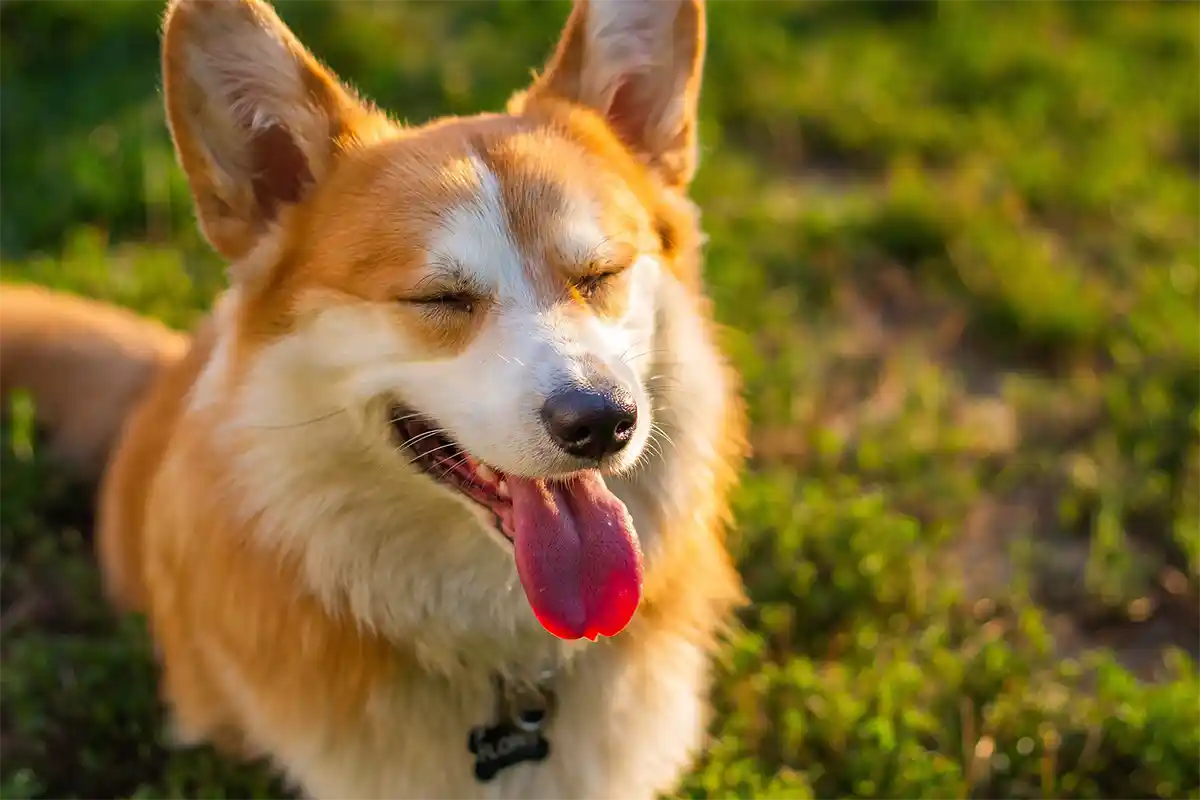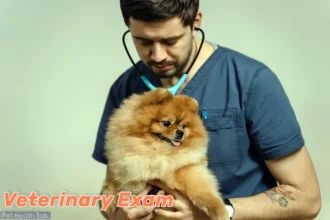Your dog’s tongue sticking out can be an adorable quirk or a sign of something more serious. While it’s often harmless, understanding the reasons behind this behavior can help you monitor your dog’s health. Here are five common causes and what you can do about them.
1. Panting and Heat Regulation
Signs It’s Normal:
Dogs primarily use panting as a way to regulate their body temperature. Unlike humans, dogs don’t have sweat glands all over their bodies. Instead, they release heat through their tongue and paw pads. When your dog’s tongue sticks out while panting, it’s likely a normal cooling mechanism.
- Happens after exercise or in warm environments.
- Accompanied by regular breathing patterns.
When to Be Concerned:
- Excessive panting in cool conditions.
- Signs of heatstroke, such as lethargy or vomiting.
What to Do: Ensure your dog has access to shade and water. Avoid strenuous activities in hot weather, and monitor for signs of overheating.
According to the American Veterinary Medical Association (AVMA), early signs of heatstroke include heavy panting, drooling, and weakness. Another study by the UC Davis School of Veterinary Medicine found that dogs’ tongues can cool blood by up to 4 degrees Celsius during panting, making it their primary cooling mechanism.
Heatstroke is a serious concern for dogs, and knowing how to respond during an emergency can save your pet’s life.
2. Relaxation and Comfort
Sometimes, a dog’s tongue sticks out simply because they’re relaxed. When dogs are in a deep sleep or completely at ease, their facial muscles, including those controlling the tongue, may loosen.
Signs It’s Harmless:
- Occurs during or after sleeping.
- No other behavioral or health changes.
What to Do: Enjoy the cuteness! This is a normal and harmless behavior that signals your dog feels safe and content. Tailwaggors recommends offering a cozy bed or blanket to help your pet relax fully.
3. Dental Problems
Dental issues, such as missing teeth, gum disease, or oral injuries, can cause a dog’s tongue to hang out. For example, if a tooth that typically supports the tongue is missing, the tongue may fall out of the mouth more frequently.
Signs of Dental Problems:
- Bad breath.
- Swollen or bleeding gums.
- Difficulty eating or chewing.
What to Do: Schedule regular dental check-ups and maintain oral hygiene by brushing your dog’s teeth or providing dental chews. If you notice signs of discomfort, consult your veterinarian.
According to the American Veterinary Dental College (AVDC), untreated dental disease can lead to serious health issues such as heart or kidney problems. The American Veterinary Dental Society (AVDS) reports that by age three, 80% of dogs show signs of dental disease, which can affect tongue position and function.
🩺 Case Study: Lucy’s Story
“Last year, I treated a 7-year-old Pomeranian named Lucy whose tongue constantly hung out on one side,” shares Dr. Knoetze. “During examination, we discovered she had lost several teeth on that side due to advanced periodontal disease.
After professional dental cleaning and establishing a proper home dental care routine, her tongue position improved significantly. Lucy’s case demonstrates how dental health directly affects tongue position and why regular dental check-ups are crucial.”
4. Hanging Tongue Syndrome
Hanging Tongue Syndrome is a condition where a dog’s tongue consistently hangs out due to genetic, neurological, or structural factors. Breeds like Pugs, Bulldogs, and other flat-faced (brachycephalic) breeds are more prone to this syndrome.
Symptoms:
- Persistent tongue protrusion, even during activity.
- Dry or cracked tongue.
What to Do: While usually harmless, a perpetually exposed tongue can dry out and become cracked. Provide water regularly and consider using a pet-safe balm to keep the tongue moisturized. If cracks or sores develop, seek veterinary advice.
According to PetMD, brachycephalic breeds often require additional care to prevent respiratory and oral issues. Cornell University’s College of Veterinary Medicine research shows that brachycephalic breeds are 60% more likely to develop Hanging Tongue Syndrome compared to other breeds.
🩺 Real Patient Experience: Max’s Adaptation
“One of my memorable patients was Max, a 3-year-old French Bulldog with Hanging Tongue Syndrome,” Dr. Knoetze recalls. “His owners were concerned about his constantly exposed tongue, especially during winter.
We developed a management plan including regular moisturizing of his tongue and increased water intake. By keeping his exposed tongue protected and moisturized, Max adapted well to his condition. Today, he’s a happy, healthy dog whose tongue just happens to add to his unique charm.”
5. Neurological Disorders
Neurological conditions can affect a dog’s muscle control, including those that keep the tongue in place. Facial nerve paralysis, degenerative diseases, or trauma can lead to tongue protrusion.
Additional Symptoms:
- Drooping on one side of the face.
- Difficulty eating or drinking.
- Changes in behavior or coordination.
What to Do: If your dog’s tongue sticking out is accompanied by other signs of neurological issues, consult a veterinarian immediately. Early diagnosis and treatment can improve outcomes.
According to the Merck Veterinary Manual, facial nerve paralysis in dogs can result from trauma or infections and often requires prompt medical attention. According to the American College of Veterinary Surgeons (ACVS), early recognition of neurological symptoms can significantly improve treatment outcomes in cases of facial nerve paralysis.
When to See a Veterinarian
While most cases of a dog’s tongue sticking out are harmless, you should contact your vet if you notice:
- Persistent tongue protrusion with other symptoms (e.g., drooling, difficulty eating).
- Unusual behavior or signs of discomfort.
- Changes in your dog’s energy levels or appetite.
Learn more about First Aid for Pets: What Every Pet Owner Should Know.
FAQ: Common Questions About Dogs and Their Tongues
1. Is it normal for my dog’s tongue to stick out?
+Yes, in many cases, it’s completely normal. Dogs may stick out their tongues when panting, relaxing, or sleeping. However, persistent tongue protrusion could indicate a health issue. Monitor the context and any accompanying symptoms.
🩺 Dr. Knoetze advises:
“If your dog’s tongue sticking out is accompanied by excessive drooling or difficulty eating, consult your veterinarian promptly.”
2. What is Hanging Tongue Syndrome?
+Hanging Tongue Syndrome is a condition where a dog’s tongue consistently hangs out of their mouth due to genetic factors, structural issues, or neurological problems. Flat-faced breeds like Bulldogs and Pugs are more prone to this syndrome.
🩺 Dr. Knoetze notes:
“Regular monitoring and proper care can prevent complications. Keep the exposed tongue moisturized and protected from extreme temperatures.”
3. Should I be worried if my dog’s tongue is dry or cracked?
+Yes, a dry or cracked tongue can lead to discomfort or infection. Ensure your dog has access to fresh water and use a pet-safe balm to keep the tongue moisturized. If the condition persists, consult a vet promptly.
🩺 Dr. Knoetze recommends:
“Monitor your dog’s water intake and check their tongue regularly for signs of dryness or injury.”
4. Can dental problems cause a dog’s tongue to stick out?
+Yes, missing teeth, gum disease, or other oral issues can affect how a dog’s tongue rests in their mouth. Regular dental care, such as brushing and professional cleanings, is essential for preventing these issues.
🩺 Dr. Knoetze emphasizes:
“Regular dental check-ups and at-home oral care are crucial for preventing dental problems that could affect tongue position.”
5. When should I see a veterinarian about my dog’s tongue?
+If your dog’s tongue is persistently sticking out and is accompanied by symptoms like drooling, difficulty eating, unusual behavior, or changes in coordination, consult a veterinarian immediately. Early intervention is key to addressing potential health issues.
🩺 Dr. Knoetze advises:
“Don’t wait if you notice concerning changes. Early detection and treatment often lead to better outcomes.”
6. Can neurological issues cause tongue protrusion in dogs?
+Yes, neurological conditions such as facial nerve paralysis or degenerative diseases can affect muscle control, causing the tongue to stick out. Watch for additional signs like drooping on one side of the face or difficulty eating and drinking, and seek veterinary advice as soon as possible.
🩺 Dr. Knoetze highlights:
“Any sudden changes in tongue position or control should be evaluated by a veterinarian to rule out neurological conditions.”
Could environmental factors or toxic plants be affecting your dog’s health?
Discover what to watch out for in our comprehensive toxic plant guide.
Conclusion
A dog’s tongue sticking out can be a charming trait or a sign of an underlying issue. By understanding these five common reasons, you can better monitor your dog’s health and provide them with the care they need. If in doubt, always consult your veterinarian for professional advice.
At Tailwaggors, we believe every quirk in our pets is worth understanding because it’s part of what makes them special. Share your story! Have you noticed your dog’s tongue sticking out? Comment below or share your tips with other pet owners using #TailwaggorsTongueTips! Contact Tailwaggors
Uncover the fascinating reasons behind why your dog’s tongue might hang out—it’s more than just a cute quirk!
🐾✨ From cooling down to relaxation, dental health, and even rare conditions like Hanging Tongue Syndrome, this guide covers it all to help you care for your furry friend.
Tag your fellow dog lovers and share your insights 🐶❤️ Let’s celebrate everything that makes our pups so unique!












